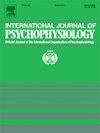Associations between intraindividual reaction time variability, baseline respiratory sinus arrhythmia, and trait impulsivity in males with substance use disorders
IF 2.5
3区 心理学
Q3 NEUROSCIENCES
引用次数: 0
Abstract
Trait impulsivity, characterized by the tendency to act without adequate consideration of potential consequences in pursuit of immediate rewards, is a recognized vulnerability marker for substance use disorders (SUDs). Cognitive control deficits are implicated in the manifestation of high trait impulsivity, and intraindividual reaction time variability (IIRTV), an indicator of cognitive control, may influence trait impulsivity. Baseline respiratory sinus arrhythmia (RSA) reflects vagal tone, serves as an index of physiological self-regulation, which has been demonstrated to be related to trait impulsivity. However, it is unclear whether IIRTV is associated with trait impulsivity and whether it interacts with baseline RSA to influence trait impulsivity. A total of 113 males with SUDs participated (Mage = 46.04 years, SD = 11.53) in this study. Trait impulsivity was assessed using a self-report questionnaire, IIRTV was measured through a two-choice oddball task, and baseline RSA was obtained through the collection of electrocardiogram (ECG) data. The results indicated that IIRTV interacted with baseline RSA to influence trait impulsivity. These findings suggested that cognitive control indexed by IIRTV, might represent a central nervous correlate of trait impulsivity, and that it interacted with vagal tone indexed by baseline RSA, to influence trait impulsivity.
有药物使用障碍的男性个体内反应时间变异性、基线呼吸窦性心律失常与特质冲动性之间的关系。
特质冲动的特点是为了追求即时回报而不充分考虑潜在后果的行为倾向,是公认的药物使用障碍(SUD)的易感性标志。认知控制缺陷与高特质冲动性的表现有关,而作为认知控制指标的个体内反应时间变异性(IIRTV)可能会影响特质冲动性。基线呼吸窦性心律失常(RSA)反映迷走神经张力,是生理自我调节的指标,已被证实与特质冲动性有关。然而,目前还不清楚IIRTV是否与特质冲动有关,以及它是否与基线RSA相互作用影响特质冲动。共有 113 名男性 SUDs 患者(年龄 = 46.04 岁,SD = 11.53)参与了本研究。特质冲动性通过自我报告问卷进行评估,IIRTV通过双选奇球任务进行测量,基线RSA通过收集心电图(ECG)数据获得。结果表明,IIRTV与基线RSA相互作用,影响特质冲动。这些研究结果表明,以IIRTV为指标的认知控制可能代表了特质冲动性的中枢神经相关因素,而以基线RSA为指标的迷走神经张力会交互影响特质冲动性。
本文章由计算机程序翻译,如有差异,请以英文原文为准。
求助全文
约1分钟内获得全文
求助全文
来源期刊
CiteScore
5.40
自引率
10.00%
发文量
177
审稿时长
3-8 weeks
期刊介绍:
The International Journal of Psychophysiology is the official journal of the International Organization of Psychophysiology, and provides a respected forum for the publication of high quality original contributions on all aspects of psychophysiology. The journal is interdisciplinary and aims to integrate the neurosciences and behavioral sciences. Empirical, theoretical, and review articles are encouraged in the following areas:
• Cerebral psychophysiology: including functional brain mapping and neuroimaging with Event-Related Potentials (ERPs), Positron Emission Tomography (PET), Functional Magnetic Resonance Imaging (fMRI) and Electroencephalographic studies.
• Autonomic functions: including bilateral electrodermal activity, pupillometry and blood volume changes.
• Cardiovascular Psychophysiology:including studies of blood pressure, cardiac functioning and respiration.
• Somatic psychophysiology: including muscle activity, eye movements and eye blinks.

 求助内容:
求助内容: 应助结果提醒方式:
应助结果提醒方式:


